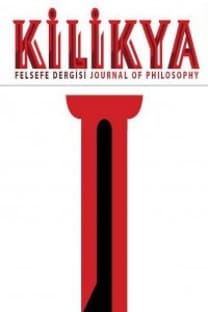Bireyleşim Sorunu: Aristoteles’in Bireyleşim İlkesi ve Özdeşlik
Aristoteles, Bireyleşim, Madde ve Form, Özdeşlik, Ayırt Edilemezlerin Özdeşliği
The Problem of Individuation: Aristotle’s Principle of Individuation and Identity
Aristotle, Individuation, Matter and Form, Identity, The Identity of Indiscernibles,
___
- Aristoteles. (1996). Metafizik. (A. Arslan, Çev.) İstanbul: Sosyal Yayınları.
- Aristoteles. (2001). Fizik. (S. Babür, Çev.) İstanbul: Yapı Kredi Yayınları.
- Black, M. (1952). The Identity of Indiscernibles. Mind, 61(242), 153-164. www.jstor.org/stable/2252291 adresinden alındı
- Charlton, W. (1972). Aristotle and the Principle of Individuation. Phronesis, 17(3), 239-249. www.jstor.org/stable/4181890 adresinden alındı
- Çevikbaş, S. (2010). Bir Şeyin, Başka Her Şeyden Ayırt Edilebilirliğini Sağlayan İlke: Bireyleşim (Aristoteles, A. Thomas, D. Scotus, Leibniz). Atatürk Üniversitesi Sosyal Bilimler Enstitüsü Dergisi, 7(1), 1-20. https://dergipark.org.tr/en/pub/ataunisosbil/issue/2817/37923 adresinden alındı
- Denkel, A. (1985). Nesne ve Doğası. İstanbul: Metis Yayınları.
- Gracia, J. (1988). Individuality: An Essay On the Foundations of Metaphysics. Albany: State University of New York Press.
- King, P. (2000). The Problem of Individuation in the Middle Ages. Theoria(66), 159-184. doi:10.1111/j.1755-2567.2000.tb01161.x
- Kuşçu, E. S. (2016). Nesne ve Bireyleşim Sorunu. İstanbul: İstanbul Üniversitesi. Sosyal Bilimler Enstitüsü. Doktora Tezi.
- Kuşçu, E. S. (2019). Bireyleşimin Önselliği. Felsefe Arkivi(51), 411-421. doi:10.26650/arcp2019-5135
- Leibniz, G. W. (2020). Leibniz: Discourse on Metaphsics. (G. Rodriguez-Pereyra, Çev.) Oxford: Oxford University Press.
- Leibniz, G. W., & Clarke, S. (2000). Correspondence. (R. Ariew, Dü.) Cambrige: Hackett Publishing Company.
- Lloyd, A. C. (1970). IV. - Aristotle's Principle of Individuation. Mind, LXXIX(316), 519-529. doi:https://doi.org/10.1093/mind/LXXIX.316.519
- Lukasiewicz, J., Anscombe, A., & Popper, K. (1953). Symposium: The Principle of Individuation. Proceedings of the Aristotelian Society(Supplementary Volumes: 27), 69-120. www.jstor.org/stable/4106559 adresinden alındı
- Macdonald, C. (2005). Varieties of Things. Oxford: Blackwell Publishing.
- Quinton, A. M. (1973). Individuation. The Nature of Things (s. 12-33). içinde London: Routledge and Kegan Paul.
- Regis, E. (1976). Aristotle's 'Principle of Individuation'. Phronesis, 21(2), 157–166. www.jstor.org/stable/4181987 adresinden alındı
- Safalı, L. (2016). Aristoteles. Youtube - Özgen Berkol Doğan Bilimkurgu Kütüphanesi: [İnternet Üzerinden]. 06 02, 2020 tarihinde https://www.youtube.com/watch?v=IM-DZlP7uO8&t=1553s adresinden alındı
- Sfekas, S. (2004). Aristotle's Principle of Individuation. First World Olympic Congress of Philosophy, (s. 1-12). Athens. doi:10.13140/RG.2.1.1068.6169
- Spinoza. (2012). Ethica. (Ç. Dürüşken, Çev.) İstanbul: Kabalcı Yayınevi.
- Yayın Aralığı: 2
- Başlangıç: 2014
- Yayıncı: Eray Yağanak
Kantçı Düşüncenin Feminist Maledilişi Olanaklı mıdır?
Kirene Okulunda Mutluluk Ahlakının Reddi
Bilimsel İlerleme ile İlgili Son Tartışmaların Değerlendirilmesi
Bireyleşim Sorunu: Aristoteles’in Bireyleşim İlkesi ve Özdeşlik
Biyoloji Felsefesinde Organizma Kavramı
Tanrısal Ön Bilgi-Özgür İrade Sorunu: Ockhamcı Çözüm
Adaletin Anarşisi: Hesiodos’un Kaos’u, Anaksimender’in Apeiron’u ve Geometrik Düşünce
Pandemiyi Olumlamak ya da Hayata Yüz Çevirmek: Nietzscheci Bir Değerlendirme
